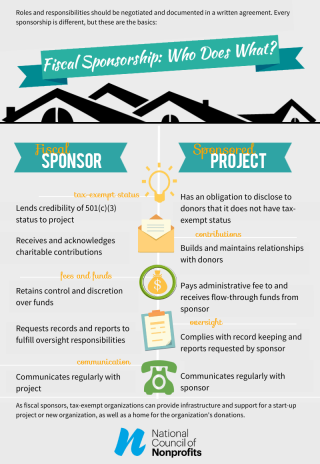Using a fiscal sponsorship arrangement offers a way for a cause to attract donors even when it is not yet recognized as tax-exempt under Internal Revenue Code Section 501(c)(3). In essence the fiscal sponsor serves as the administrative "home" of the cause. Charitable contributions are given to the fiscal sponsor, which then grants them to support the cause. Learn about fiscal sponsorship in this short video (NEO Law Group).
A fiscal sponsor is a nonprofit organization that provides fiduciary oversight, financial management, and other administrative services to help build the capacity of charitable projects.
Fiscal Sponsorship: a 360 Degree Perspective, Trust for Conservation Innovation.
What does a fiscal sponsor do?

The role of the fiscal sponsor can include performing many different administrative functions on behalf of the sponsored organization or program, including taking on the responsibility of receiving and administering charitable contributions on behalf of the sponsored organization. Some fiscal sponsors do a lot more, such as performing back-office functions.
It is quite common and perfectly acceptable for the fiscal sponsor to charge an administrative fee for its services, which is usually a percentage of the budget of the sponsored organization or program. Using a fiscal sponsor satisfies IRS requirements as long as the fiscal sponsor maintains the right to decide, at its own discretion, how it will use contributions. Maintaining control over the donated funds is a requirement of a legitimate fiscal sponsor arrangement.
Why choose fiscal sponsorship?
Fiscal sponsorship is often used by newly formed nonprofits that need to raise money during the start-up phase, before they are recognized as tax-exempt by the IRS. Using a fiscal sponsor enables a program or organization that does not itself qualify as tax-exempt to attract funding for its operations that will -- through the fiscal sponsor - be tax-deductible to donors. Therefore fiscal sponsor arrangements benefit organizations or programs that are not tax-exempt by providing a flow-through pathway for revenue that the organization may not otherwise be in a position to receive.
- Donors are not able to claim a tax deduction unless they itemize deductions and donate to an organization that is recognized by the IRS as tax-exempt pursuant to IRS Code Section 501(c)(3). See IRS Publication 557.
- Additionally, the guidelines of most private foundations explicitly require grantees to be recognized as tax-exempt by the IRS. Consequently, groups that are not formally recognized by the IRS as tax-exempt are generally not eligible for grants from private foundations.
Other reasons:
- Fiscal sponsorship might be chosen by a newly formed nonprofit that seeks to test-drive its ideas to determine whether there is a market or a desire among the public to fund the end product.
- Some organizations/programs remain in a fiscal sponsorship relationship for a long time, deciding that their mission can be achieved in that structure without creating a new entity.
- Some organizations - including those that are tax-exempt - find that utilizing a fiscal sponsor to outsource administrative responsibilities, whether back-office tasks, or those relating to fundraising and disbursement of funds, is the right business model for them. This structure might be particularly well-suited for all-volunteer organizations.
- In its 2021 report, "Reimagining Fiscal Sponsorship in Service of Equity," TSNE explored how fiscal sponsors can provide holistic, responsive, and culturally aligned fiscal management for under-resourced, BIPOC-led grassroots groups working to support marginalized communities.
Practice Pointers
It's best to outline the responsibilities and obligations of both parties in a written agreement between the fiscal sponsor and the sponsored organization. A sample is posted below. The agreement should specify that the fiscal sponsor is responsible for all legal compliance relating to receiving, reporting, and acknowledging charitable donations. The agreement should also describe the administrative fee that the sponsored organization will provide to its fiscal sponsor, as well as any recordkeeping responsibilities that the sponsored organization owes the fiscal sponsor.
See this page for more useful resources for those looking for more details and ideas on where to find a fiscal sponsor or what to think about if your organization is considering serving as a fiscal sponsor.
Additional Resources
- Alternatives to starting a nonprofit (Minnesota Council of Nonprofits)
- Can our group fundraise while we're waiting for designation as a tax-exempt organization? (NEO Law Group)
- Fiscal Sponsor versus Fiscal Agency (CharityLaw Blog)
- Fiscal Sponsorship: A balanced overview (Nonprofit Quarterly)
- Fiscal Sponsorship: What and Why? (video from Propel Nonprofits)
Disclaimer: Information on this website is provided for informational purposes only and is neither intended to be nor should be construed as legal, accounting, tax, investment, or financial advice. Please consult a professional (attorney, accountant, tax advisor) for the latest and most accurate information. The National Council of Nonprofits makes no representations or warranties as to the accuracy or timeliness of the information contained herein.
